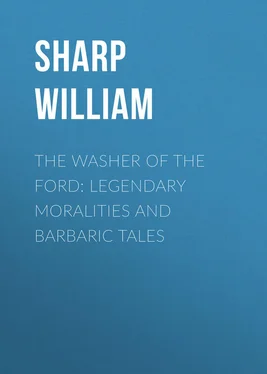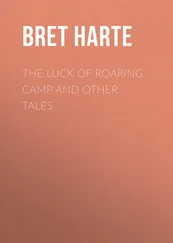William Sharp - The Washer of the Ford - Legendary moralities and barbaric tales
Здесь есть возможность читать онлайн «William Sharp - The Washer of the Ford - Legendary moralities and barbaric tales» — ознакомительный отрывок электронной книги совершенно бесплатно, а после прочтения отрывка купить полную версию. В некоторых случаях можно слушать аудио, скачать через торрент в формате fb2 и присутствует краткое содержание. Жанр: foreign_antique, foreign_prose, на английском языке. Описание произведения, (предисловие) а так же отзывы посетителей доступны на портале библиотеки ЛибКат.
- Название:The Washer of the Ford: Legendary moralities and barbaric tales
- Автор:
- Жанр:
- Год:неизвестен
- ISBN:нет данных
- Рейтинг книги:3 / 5. Голосов: 1
-
Избранное:Добавить в избранное
- Отзывы:
-
Ваша оценка:
- 60
- 1
- 2
- 3
- 4
- 5
The Washer of the Ford: Legendary moralities and barbaric tales: краткое содержание, описание и аннотация
Предлагаем к чтению аннотацию, описание, краткое содержание или предисловие (зависит от того, что написал сам автор книги «The Washer of the Ford: Legendary moralities and barbaric tales»). Если вы не нашли необходимую информацию о книге — напишите в комментариях, мы постараемся отыскать её.
The Washer of the Ford: Legendary moralities and barbaric tales — читать онлайн ознакомительный отрывок
Ниже представлен текст книги, разбитый по страницам. Система сохранения места последней прочитанной страницы, позволяет с удобством читать онлайн бесплатно книгу «The Washer of the Ford: Legendary moralities and barbaric tales», без необходимости каждый раз заново искать на чём Вы остановились. Поставьте закладку, и сможете в любой момент перейти на страницу, на которой закончили чтение.
Интервал:
Закладка:
William Sharp
The Washer of the Ford: Legendary moralities and barbaric tales
CONTENTS
“Here are told the stories of these pictures of the imagination, of magic and romance. Yet they were gravely chosen withal, and for reasons manifold… What if they be but dreams? ‘We are such stuff as dreams are made of.’ What if they be but magic and romance? These things are not ancient and dead, but modern and increasing. For wherever a man learns power over Nature, there is Magic; wherever he carries out an ideal into Life there is Romance.”
Patrick Geddes: “The Interpreter.”PROLOGUE
I find, under the boughs of love and hate,
Eternal Beauty wandering on her way.
TO you, in your far-away home in Provence, I send these tales out of the remote North you love so well, and so well understand. The same blood is in our veins, a deep current somewhere beneath the tide that sustains us. We have meeting-places that none knows of; we understand what few can understand; and we share in common a strange and inexplicable heritage. It is because you, who are called Kathia of the Sunway, are also Kathia nan Ciar, Kathia of the Shadow, it is because you are what you are that I inscribe this book to you. In it you will find much that is familiar to you, though you may never have read or heard anything of the kind; for there is a reality, beneath the unfamiliar accident, which may be recognised in a moment as native to the secret life that lives behind the brain and the wise nerves with their dim ancestral knowledge.
The greater portion of this book deals with the remote life of a remote past. “The Shadow-Seers,” however, though of to-day, may equally be of yesterday or to-morrow; and as for “The Last Supper” or “The Fisher of Men,” they are of no time or date, for they are founded upon elemental facts which are modified but not transformed by the changing years.
It may be the last of its kind I shall write – at any rate, for a time. I would like it to be associated with you, to whom not only the mystery but the pagan sentiment and the old barbaric emotion are so near. With the second sight of the imagination we can often see more clearly in the perspectives of the past than in the maze of the present; and most clearly when we recognise that, below the accidents of time and circumstance, the present is but a reflection of that past to which we belong – belong, as intimately and inalienably, as to the hour wherein happily content we swing to those anchors which we do not see are linked to us by ropes of sand.
If I am eager to have my say on other aspects of our Celtic life in the remoter West Highlands and in the Isles: now with the idyllic, now with the tragic, now with the grotesque, the humorous, the pathetic, with all the medley cast from the looms of Life – all that and if, too, I long to express anew something of that wonderful historic romance in which we of our race and country are so rich, I am not likely to forget those earlier dreams which are no whit less realities – realities of the present seen through an inverted glass – which have been, and are, so full of inspiration and of a strange and terrible beauty.
“… from the looms of Life are spun,
Warp of shadow and woof of sun – ”
But one to whom life appeals by a myriad avenues, all alluring and full of wonder and mystery, cannot always abide where the heart longs most to be. It is well to remember that there are shadowy waters even in the cities, and that the Fount of Youth is discoverable in the dreariest towns as well as in Hy Bràsil: a truth apt to be forgotten by those of us who dwell with ever-wondering delight in that land of lost romance which had its own day, as this epoch of a still stranger, if a less obvious, romance has its own passing hour.
The titular piece – with its strange name that will not be unfamiliar to you who know our ancient Celtic literature, or may bear in mind the striking use made of it and its vague cognate legend, by Ferguson, in his Irish epic, Congal – gives the keynote not only of this book but of what has for hundreds of years, and to some extent still is, the characteristic of the purely Celtic mind in the Highlands and the Isles. This characteristic is a strange complexity of paganism and Christianity, or rather an apparent complexity arising from the grafting of Christianity upon paganism. Columba, St. Patrick, St. Ronan, Kentigern, all these militant Christian saints were merely transformed pagans. Even in the famous dialogue between St. Patrick and Oisìn, which is the folk-telling of the passing of the old before the new, the thrill of a pagan sympathy on the part of the uncompromising saint is unmistakable. To this day, there are Christian rites and superstitions which are merely a gloss upon a surviving antique paganism. I have known an old woman, in no wise different from her neighbours, who on the day of Beltane sacrificed a hen: though for her propitiatory rite she had no warrant save that of vague traditionary lore, the lore of the teinntean , of the hearth-side – where, in truth, are best to be heard the last echoes of the dim mythologic faith of our ancestors. What is the familiar “clachan,” now meaning a hamlet with a kirk, but an echo of the Stones, the circles of the druids or of a more ancient worship still, that perhaps of the mysterious Anait, whose sole record is a clach on a lonely moor, of which from time immemorial the people have spoken as the “Teampull na’n Anait”? A relative of mine saw, in South Uist, less than twenty-five years ago, what may have been the last sun-sacrifice in Scotland, when an old Gael secretly and furtively slew a lamb on the summit of a conical grassy knoll at sunrise. Those who have the Gaelic have their ears filled with rumours of a day that is gone. When an evicted crofter laments, O mo chreach, mo chreach! 1 1 Oh, alas, alas! (Literally, Oh, my undoing, or Oh, my utter ruin.)
or some poor soul on a bed of pain cries, O mo chradshlat , 2 2 Alas my torment!
he who knows the past recognises in the one the mournful refrain of the time when the sea-pirates or the hill-robbers pillaged and devasted quiet homesteads, and, in the other, not the moan of suffering only, but the cry of torment from the victim racked on the cradhshlat , a bitter ignominious torture used by the ancient Gaels. When, in good fellowship, one man says to another, Tha, a laochain (yes, my dear fellow), he recalls Fionn and the chivalry of eld, for laochan is merely a contraction for laoch-Fhinn, meaning a companion in war, a hero, literally Fionn’s right-hand man in battle. To this day, women, accompanying a marching regiment, are sometimes heard to say in the Gaelic, “We are going with the dear souls to the wars” – literally an echo of the Ossianic Siubhlaidh sinn le’n anam do’n araich , “We shall accompany their souls to the battle-field.” A thousand instances could be adduced. The language is a herring-net, through which the unchanging sea filtrates, even though the net be clogged with the fish of the hour. Nor is it the pagan atmosphere only that survives: often we breathe the air of that early day when the mind of man was attuned to a beautiful piety that was wrought into nature itself. Of the several words for the dawn, there is a beautiful one, Uinneagachadh . We have it in the phrase ’nuair a bha an latha ag uinneagachadh , “when the day began to dawn.” Now this word is simply an extension of Uinneag , a window: and the application of the image dates far back to the days of St. Columba, when some devout and poetic soul spoke of the uinneagan Neimh , the windows of Heaven.
Интервал:
Закладка:
Похожие книги на «The Washer of the Ford: Legendary moralities and barbaric tales»
Представляем Вашему вниманию похожие книги на «The Washer of the Ford: Legendary moralities and barbaric tales» списком для выбора. Мы отобрали схожую по названию и смыслу литературу в надежде предоставить читателям больше вариантов отыскать новые, интересные, ещё непрочитанные произведения.
Обсуждение, отзывы о книге «The Washer of the Ford: Legendary moralities and barbaric tales» и просто собственные мнения читателей. Оставьте ваши комментарии, напишите, что Вы думаете о произведении, его смысле или главных героях. Укажите что конкретно понравилось, а что нет, и почему Вы так считаете.












